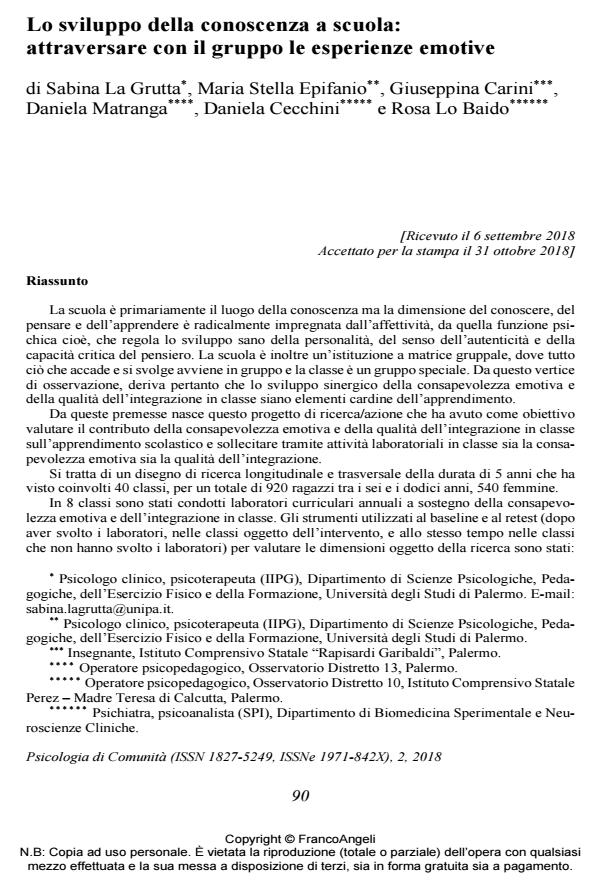The development of knowledge in School: experiencing the emotional feelings through a group
Journal title PSICOLOGIA DI COMUNITA’
Author/s Sabina La Grutta, Maria Stella Epifanio, Giuseppina Carini, Daniela Matranga, Daniela Cecchini, Rosa Lo Baido
Publishing Year 2018 Issue 2018/2
Language Italian Pages 12 P. 90-101 File size 511 KB
DOI 10.3280/PSC2018-002008
DOI is like a bar code for intellectual property: to have more infomation
click here
Below, you can see the article first page
If you want to buy this article in PDF format, you can do it, following the instructions to buy download credits

FrancoAngeli is member of Publishers International Linking Association, Inc (PILA), a not-for-profit association which run the CrossRef service enabling links to and from online scholarly content.
School is the natural place for the development of knowledge but knowledge, thinking and learning are essentially impregnated with affectivity, which is a psychological function that regulates the healthy development of personality, the feeling of authenticity and the individual critical thinking. School is also an institution made of group-set where everything takes place in a group format and the class may be considered as a special group. For those reasons, the development of emotional awareness and of inclusive classroom is central elements of learning. This study aimed to investigate the influence of emotional awareness and the quality of class inclusion on school learning, to promote both emotional awareness and class inclusion through some group activities. It is a five years cross-sectional and longitudinal study design. The participants were 920 children (40 classes) aged between 6 and 12. In 8 classes there were group activities to improve emotional awareness and inclusion in classroom. Pictures of Facial Affect (Ekman, 1972), "Tecnica delle storie disegnate" (Trom-bini, 1994), "Disegno della classe" (Quaglia, Saglione, 1990), Coloured Progressive Matrices di J.C. Raven (CPM, 1981, tr. it. 1996) were administered at baseline and at retest both to the experimental groups and to the control groups. Results have shown that participating in group activities on affective development im-proves emotional awareness and the level of class inclusion; emotional awareness, problem solving skills, level of inclusion in class and female gender have influence on writing and speaking Italian. In conclusion, it emerges that these group activities improved psychological, emotional and cognitive development.
Keywords: Emotional feeling, group, school
- Mancini G. e Trombini E. (2011) Dalle emozioni all’intelligenza emotiva. Comprendere per educare. Torino: Espress.
- Ahnert L., Harwardt-Heinecke E., Kappler G., Eckstein-Madry T. e Milatz A. (2012). Student-teacher relationships and classroom climate in first grade: how do relate to students’ stress regulation. Attachment and Human Development, 14 (3): 249-263. DOI: 10.1080/14616734.2012.67327
- Bion W.R. (1962). Apprendere dall’esperienza. Roma: Armando, 1994.
- Bion W.R. (1963). Gli elementi della psicoanalisi. Roma: Armando, 1995.
- Bion W.R. (1961). Experiences in groups and other papers. London: Tavistock Pubblications (tr. it. Esperienze nei gruppi. Roma: Armando, 2000).
- Bion W.R. (1962). A theory of thinking. International Journal of Psycho-Analysis, 43. Trad. it. Pensare una teoria. In Analisi degli schizofrenici e metodo psicoanalitico. Roma: Armando, 1970.
- Blandino G. (2008). Quando insegnare non è più un piacere. Milano: Raffaello Cortina.
- Blandino G., Granieri B. (1995). La disponibilità ad apprendere. Dimensioni emotive nella scuola e formazione degli insegnanti. Milano: Raffaello Cortina.
- Cappella E., Hamre B.K., Kim H.Y., Henry D.B., Frazier S.L., Atkins M.S., Schoenwald S.K. (2012). Teacher consultation and coaching within mental health practice: classroom and child effects in urban elementary schools. Journal of Consulting and Clinical Psychology, 80 (4): 597-610.
- Di Mauro M. (2002). Comunicare bene, insegnare bene. Roma: Armando.
- Ekman P. (1972). Facial Expressions of Emotion. Stimuli and Tests (FEEST), London: Thames Valley Test Company, 2002.
- Epifanio M.S., La Grutta S., Roccella M. e Lo Baido R. (2014). L’alessitimia come disturbo della regolazione affettiva. Minerva Psichiatrica, 55: 193-205, ISSN: 03911772, Codice Scopus 2-s2.0-84929925245
- Francescato D. e Putton A. (2004). L’empowerment a scuola. Roma: Carocci.
- Francescato D., Putton A. e Cudini S. (1986). Stare bene insieme a scuola. Roma: Carocci.
- Gordon T. (1991). Insegnanti efficaci. Teramo: Giunti Lisciani.
- Graziano P.A., Reavis R.D., Keane S.P. e Calkins S.D. (2007). The Role of Emotion Regulation and Children’s Early Academic Success. Journal of School Psychology, 45 (1): 3-19.
- Mancini G. e Trombini E. (2017). Intelligenza emotiva. Teoria, ricerca, intervento nei contesti psicoeducativi. Bologna: Clueb.
- Mitchell M.M., Bradshaw C.P. e Leaf P.J. (2010). Student and Teacher perceptions of school climate: a multilevel exploration of patterns of discrepancy. The Journal of School Health, 80 (6): 271-279.
- Opdenakker M.C. e Minnaert A. (2011). Relationship between learning environment characteristics and academic engagement. Psychological Reports, 109 (1): 259-284. DOI: 10.2466/09.10.11.PR0.109.4.259-28
- Quaglia R. e Saglione G. (1990). Il disegno della classe. Torino: Bollati Boringhieri.
- Raven J.C. (1981). Coloured Progressive Matrices (CPM). Firenze: Giunti OS, 1996.
- Rosenblitt D.L. (2005). Translating child analysis from the playroom to the classroom: opportunities and choices. Journal of the American Psychoanalytic Association, 53 (1): 189-211. DOI: 10.1177/0003065105053001180
- Sabol T.J. e Pianta R.C. (2012). Recent trends in research on teacher-child relationship. Attachment and Human Development, 14: 213-231. DOI: 10.1080/14616734.2012.67226
- Scafidi Fonti G.M., La Grutta S. e Trombini E. (2015) (a cura di). Elementi di psicodiagnostica. Aspetti teorici e tecnici della valutazione. Textbook, vol. 1240.1.56, Milano: FrancoAngeli.
- Schmitt M.B., Pentimonti J.M. e Justice L.M. (2012). Teacher-child relationships, behavior regulation and language gain among at risk preschoolers. Journal of School Psychology, 50 (5): 681-699.
- Trombini G. (1994) (a cura di). Introduzione alla clinica psicologica. Bologna: Zanichelli.
- Wight M. e Chapparo C. (2008). Social competence and learning difficulties: teacher perceptions. Australian Occupational Therapy Journal, 55 (4): 256-265.
Sabina La Grutta, Maria Stella Epifanio, Giuseppina Carini, Daniela Matranga, Daniela Cecchini, Rosa Lo Baido, Lo sviluppo della conoscenza a scuola: attraversare con il gruppo le esperienze emotive in "PSICOLOGIA DI COMUNITA’" 2/2018, pp 90-101, DOI: 10.3280/PSC2018-002008